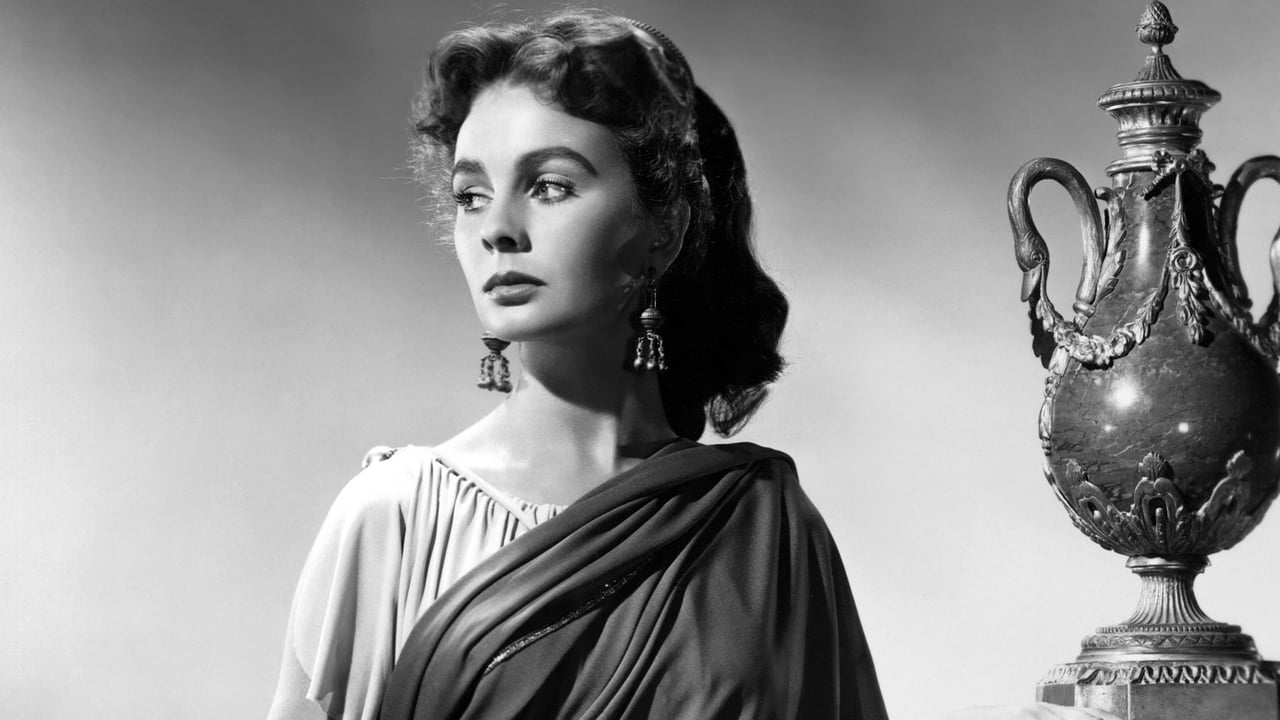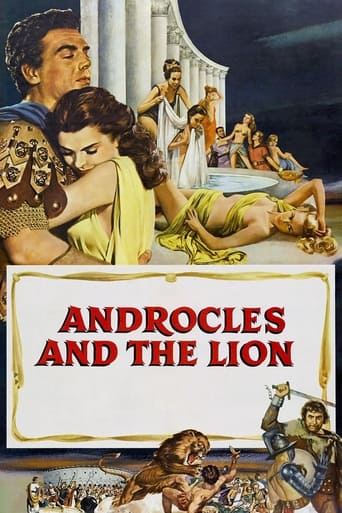



the leading man is my tpye
Highly Overrated But Still Good
Am I Missing Something?
One of the best movies of the year! Incredible from the beginning to the end.
View MoreProducer: Gabriel Pascal. Executive producer: Howard Hughes. A Gabriel Pascal Production, produced and released by RKO Radio. Animals supplied by Sid Fogel. Lion (Jackie II) trained by Mel Koontz.Copyright 30 October 1952 by RKO Radio Pictures. New York opening at the Capitol: 14 January 1953. U.S. release: 9 January 1953. U.K. release: 8 March 1954 (sic). Australian release: 23 April 1953. Sydney opening at the Esquire. 98 minutes.SYNOPSIS: Ancient Rome. A henpecked tailor extracts a thorn from a lion's paw. This good deed later proves to be his salvation when he meets up with the lion again in the Colosseum.NOTES: Last of Gabriel Pascal's four films, all adaptations of Shaw plays. Originally, Harpo Marx was cast as Androcles, Rex Harrison as Caesar, Dana Andrews as the Captain and George Sanders as Lentulus. Pascal felt Harpo was "the perfect Androcles" and from all accounts, the rushes were absoluteky brilliant. But five weeks into shooting, mega-rich producer Howard Hughes saw Alan Young on some trashy TV show and insisted Young be substituted for Harpo. But Young was not free. His agent had signed contracts all over the place. So Hughes bought up all Young's contracts. By the time this was all settled and shooting was ready to get under way again, only Jean Simmons and Robert Newton were still available to continue in their original roles. All the footage that had been shot was scrapped and Pascal, now firmly under the thumb of Howard Hughes, started shooting again from square one. As a result of Hughes' antics and his decisive interference, Androcles and the Lion is only remembered today as one of Hollywood's costliest failures.COMMENT: Commences in sprightly fashion, but unfortunately, mingled with the excellent wit, satire and comedy is a banal little romance involving Jean Simmons and Victor Mature of all people who rattles off lines about his "dooty" as a soldier until we are blue in the face with boredom. But if Mature overacts, Robert Newton is even worse. Alan Young starts well, but he also plays his part too broadly, especially in the later, sentimental sequences. Fortunately, a brilliant performance by Maurice Evans as Caesar virtually saves the film, though Gene Lockhart and Reginald Gardiner also contribute some deftly-played scenes. Aside from the wit and the amusement offered by about half of the film's episodes, there is a little spectacle for those whose eyes like to dwell on Harry Horner's recreation of the architectural triumphs of ancient Rome. Also outstanding are Stradling's photography and Hollander's music score. On the other hand, Erskine's direction is strictly routine.
View MoreWhatever the reverse of deja vu is you'll find it here inasmuch as three of the cast played similar roles in similar films within a year of two of this one. John Hoyt went on to play Decius Brutus in Mank's Julius Caesar whilst Jean Simmons played an almost identical role to the one here in The Robe in which Victor Mature also appeared. Other than that there is little remarkable in this fairly affable adaptation of George Bernard Shaw's satire on early Christianity written, as the majority of Shaw's work, for the theatre. Alan Young makes a decent fist of the eponymous Androcles and though he played a couple more leads his career faded within the decade. Jean Simmons made her US debut here and went on to enjoy several decades of success whilst most of Victor Mature's best work (Kiss Of Death, Easy Living, was behind him. Worth seeing but not worth buying the DVD.
View MoreGeorge Bernard Shaw was hesitant about allowing his plays to be turned into movies. He was impressed with motion pictures, and frequently allowed himself to be in short subjects where he could reveal his current social theories. Shaw was probably the first major literary figure to leave several reels of film interviews. But he was aware of the liberties taken with literary properties turned into movies - particularly plays. Shakespeare had not fared too well in the movies up to the 1930s. Most filmed plays seemed cut up - the screenwriters, producers, and directors being concerned with time factors. Shaw did not trust his works in their hands.Shaw found an above-average producer in Gabriel Pascal. Pascal loved Shaw's works and he went to see him. He admitted that he had little money but showed his devotion to Shaw's ideas. Shaw gave him a contract to produce all his plays. From 1938 to 1950 Pascal only produced three films but they were PYGMALION with Leslie Howard and Wendy Hiller, MAJOR BARBARA with Hiller, Robert Morley, Rex Harrison, and Robert Newton, and CAESAR AND CLEOPATRA with Vivian Leigh, Claude Rains, Steward Granger, and Flora Robson. They all remain memorable movies to this day. Although Shaw did complain of some deletions he was well served by these films.In 1950 Shaw died, but his contract with Pascal was to last until Pascal died. However, Pascal only produced one last film, ANDROCLES AND THE LION. Produced by RKO it was the shortest of the Pascal movies, most likely due to the production standards and controls of RKO boss Howard Hughes. The casting was quite unique, in that the roles were played by pretty well known actors: Newton again, Alan Mowbray, Reginald Gardiner, Victor Mature, Jean Simmons, and Maurice Evans. Although Mature is stiff he gives a capable performance. Newton (not drunk here, like he was in BLACKBEARD) showed what a fine comic actor he could be. Witness the scene where he almost frightens Gardiner to death while explaining why he has become a changed man since he converted to Christianity. Maurice Evans, best recalled now as "Maurice" the father of Samantha on BEWITCHED, gave one of his three best lead parts (with his villain in KIND LADY and his Sir Arthur Sullivan in THE GREAT GILBERT AND SULLIVAN)as the philosophic Roman Emperor. Simmons lightens the film's love story with Mature. She always gave good performances. The interesting role in the film is the lead: Alan Young.Young's career was taking off in 1952. He had started appearing on television in his own weekly variety/comedy program. He also was looking forward to other film roles. There would be another lead part in the now forgotten AARON SLICK FROM PUNKIN CREEK shortly afterward, and eventually nice supporting roles in TOM THUMB and (possibly his best performance) THE TIME MACHINE (1960). And then his role as Wilbur Post in MR. ED. Not a tremendous career but it got quite a bit of mileage in it, and it is still recalled fondly. He gives a nice performance as a soft-spoken, meek Androcles, who represents the truest spirit of Christianity of all the characters in the film (most of whom do not fully grasp the simplicity and quiet goodness at the heart of the faith). It does not hold center stage or attention in the movie (in fact it is forgotten while we concentrate on the antics of Newton's "muscular" Christianity or the Simmons/Mature romance or Evans' cat and mouse game with a courtier who happens to be a secret Christian, but also a political opportunist). But when Young turns up again, he does keep our attention in his scenes.The result is an enjoyable film, but not of the standard of the three preceding ones. It would be the model (now that Shaw was dead, and soon after Pascal) of how the movies would treat Shaw's plays. The great dramatist was lucky that Pascal gave his all on those first three, for (except for the film of the musical version of PYGMALION - MY FAIR LADY) most of the remaining films of Shaw's plays (THE DOCTOR'S DELEMMA, THE DEVIL'S DISCIPLE, THE MILLIONAIRESS, GREAT CATHERINE) showed more of the cutting and rewriting - and usually inferior rewriting - that Shaw dreaded. Of the post-1952 films only THE DEVIL'S DISCIPLE and MY FAIR LADY hold up really well.But there is one intriguing mystery about this film project. Pascal and Howard Hughes did come up with an odd casting of the lead role that was not seen to it's conclusion to the everlasting loss of motion pictures. Androcles was not originally cast for Alan Young, but for Harpo Marx. There were discussions with Harpo to play the role, and there may have been some actual footage shot for about a month, when Hughes decided it was not going to work out. Harpo was removed from the film, and Young got the role. Leaving a great hole in the story: what was the original film to be - was Harpo to perform his usual way (pantomime) or did he actually essay for the first time in his career to speak the lines. We don't know. While footage of lost movies occasionally turns up (such as Joseph Von Stenberg's I CLAUDIUS), most of these films that are jettisoned are destroyed. One hopes that Harpo's attempted performance was put on some film that has survived. It would be wonderful to see him in a talking role in a serious play by an English literary master. Harpo prided himself on his erudition and self-taught education He was a member of the Algonquin Circle with Kaufman and Hart, Alexander Woolcott, Edna Ferber, and Morris Ryskind. He should have made a fascinating figure as Androcles, but instead he was replaced. I safely feel it was our loss.
View MoreA famously bad movie of a minor Shaw play, Androcles and the Lion isn't bad so long as one doesn't approach it expecting a sparkling and witty adaptation along the lines of Major Barbara. To be fair to producer Garbriel Pascal, who loved Shaw's work dearly, and director Chester Erskine, an experienced theatre man, the play wasn't that good to start with. In trying to make their picture look like a spectacle, and casting hunky Victor Mature in a major role, Pascal and Erskine at least give the viewer something pleasing and familiar to look at. The presence of Jean Simmons doesn't hurt, either, though her padrone, studio chief Howard Hughes, was in the process of inadvertantly wrecking her American career with inferior movies. In the roles as early Christians, Alan Young and Robert Newton make a terrific pair, and ought to have been co-starred again. Mr. Young's endearingly innocent, child-like and effeminate Androcles makes a fascinating contrast with Newton's bellowing, hyper-virile Ferrovius, and one wonders, if one adds to the mix the mere presence of Victor Mature, was going on subliminally in the minds of Pascal and Erskine when they cast this film. (Young fared far better with the animal kingdom some years later on television, as friend and companion of the irascible and unpredictable equine, Mr. Ed.)
View More